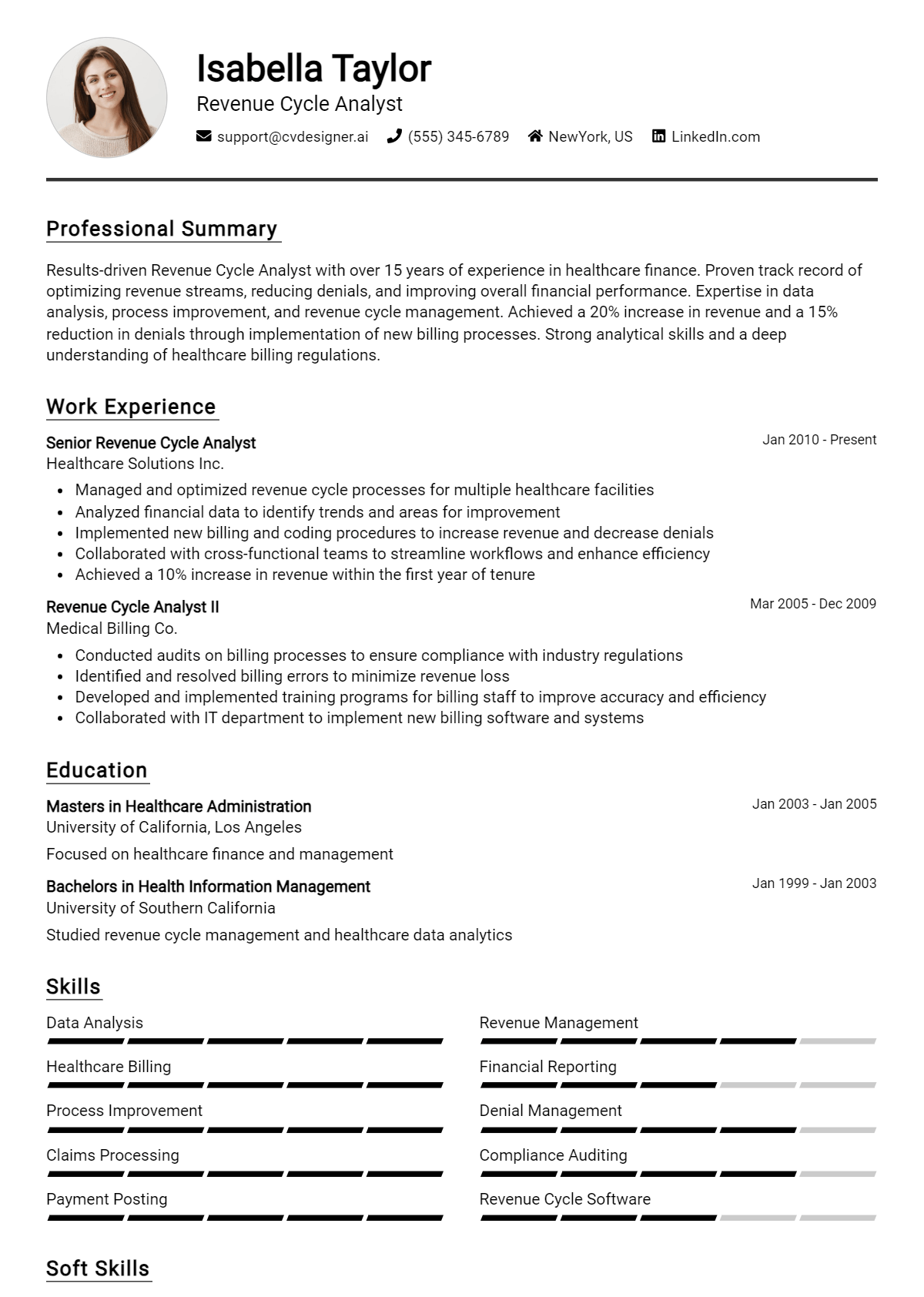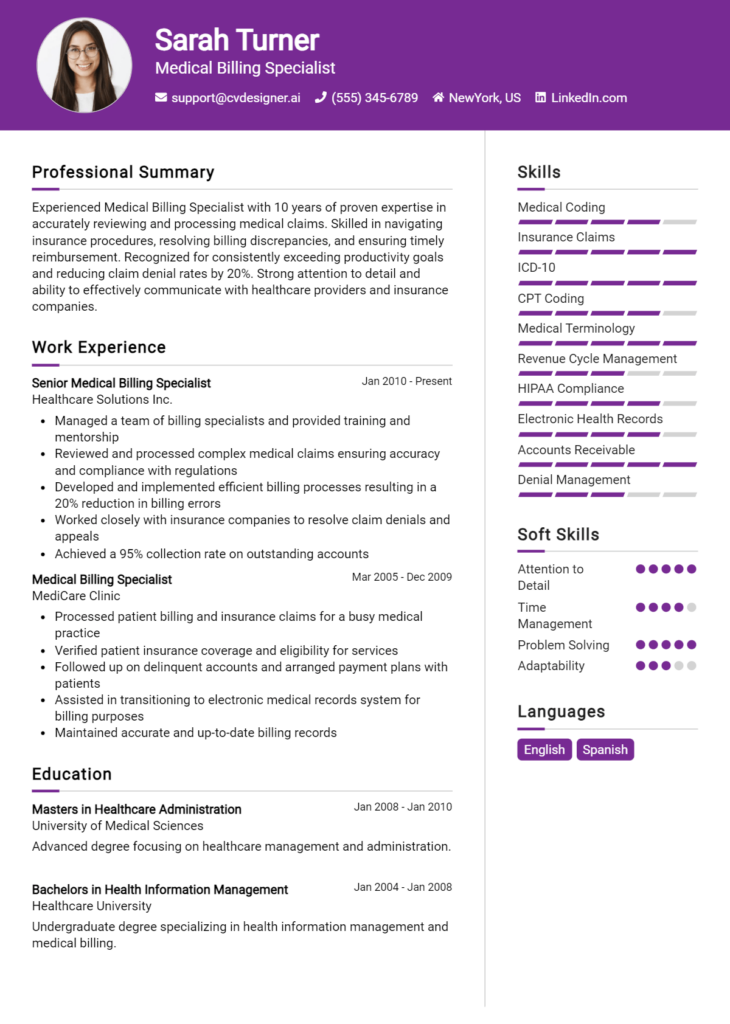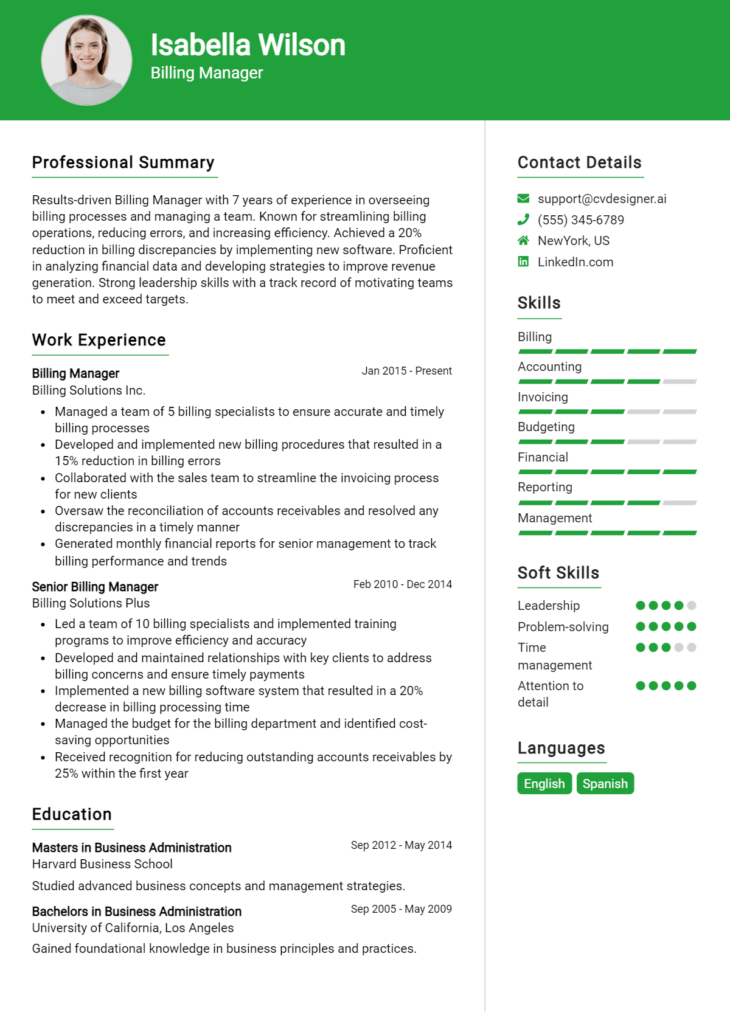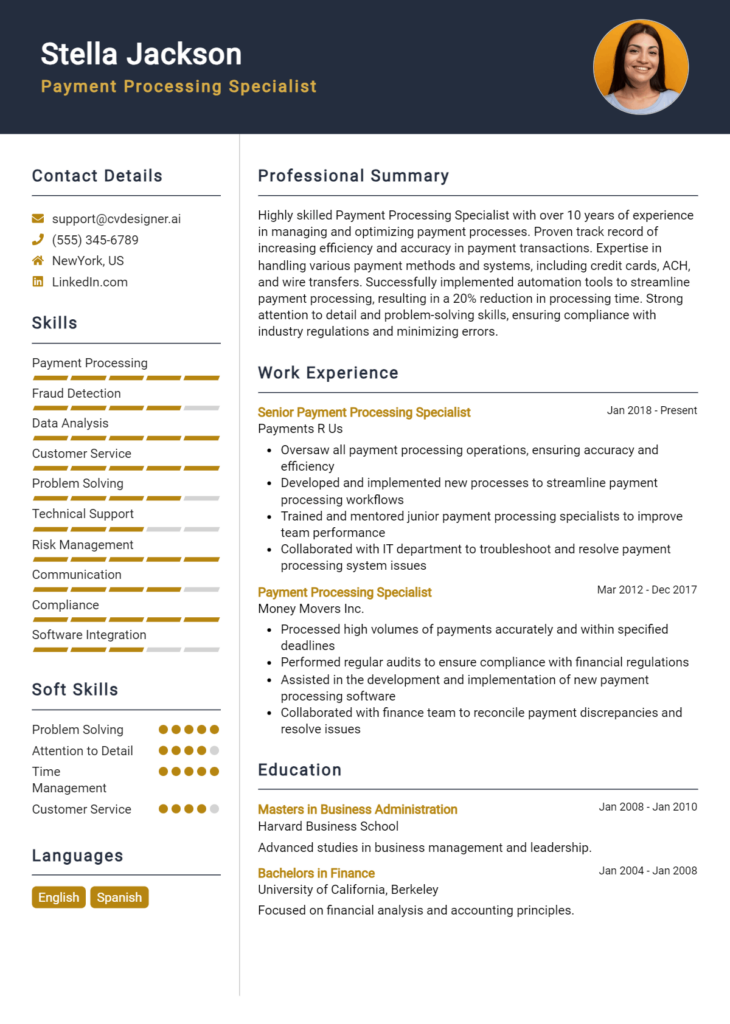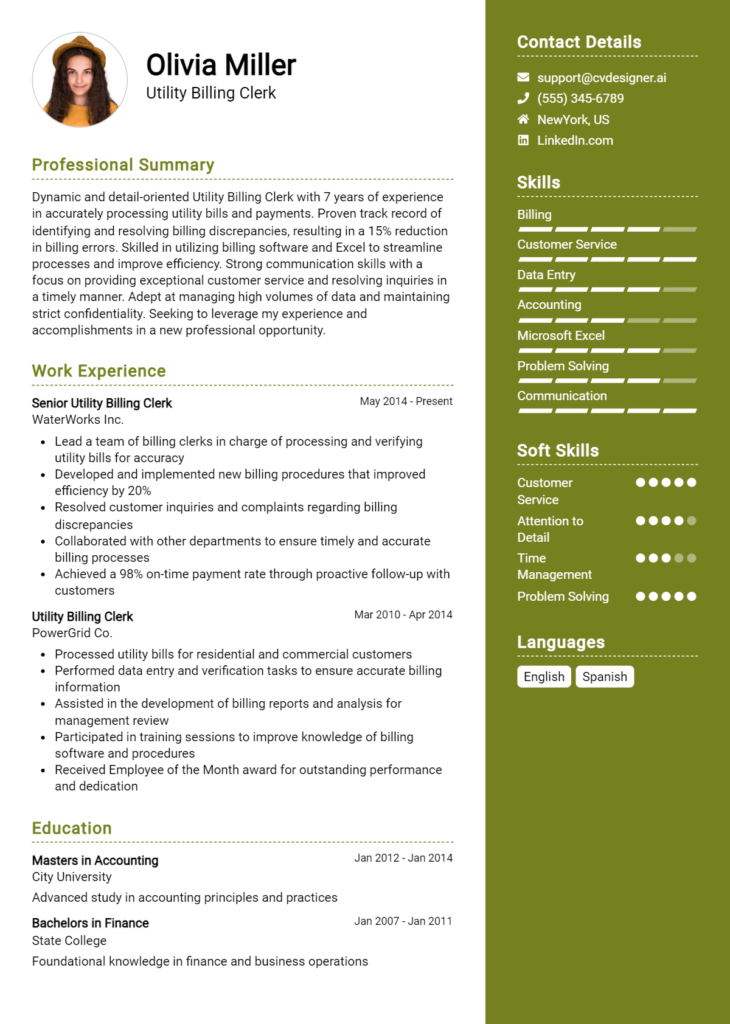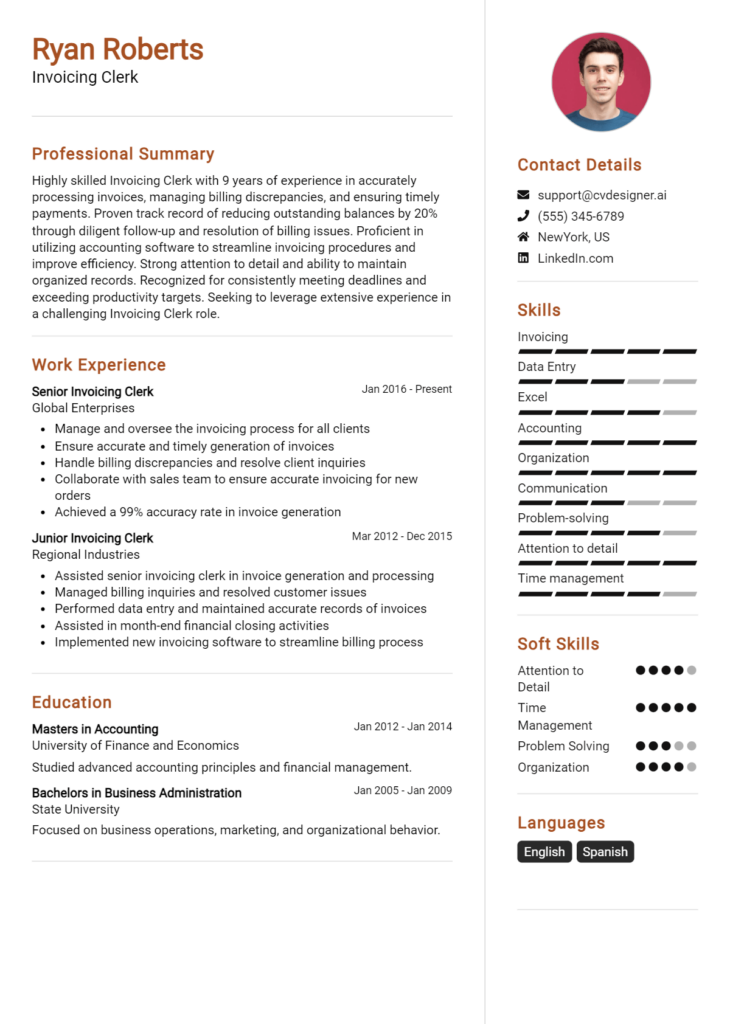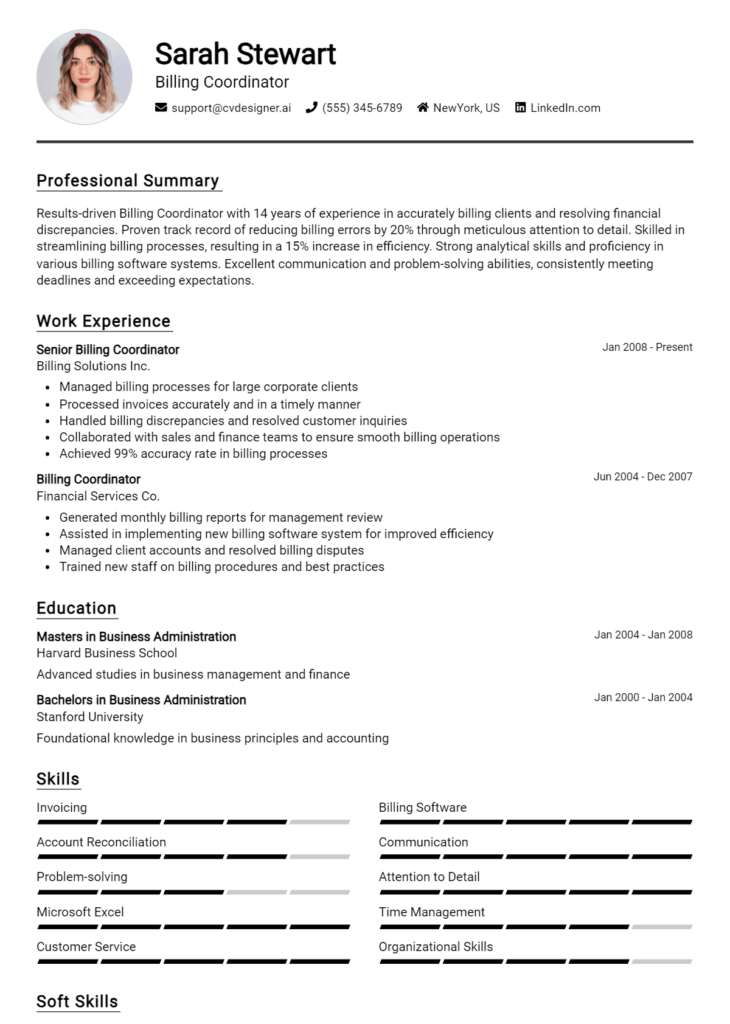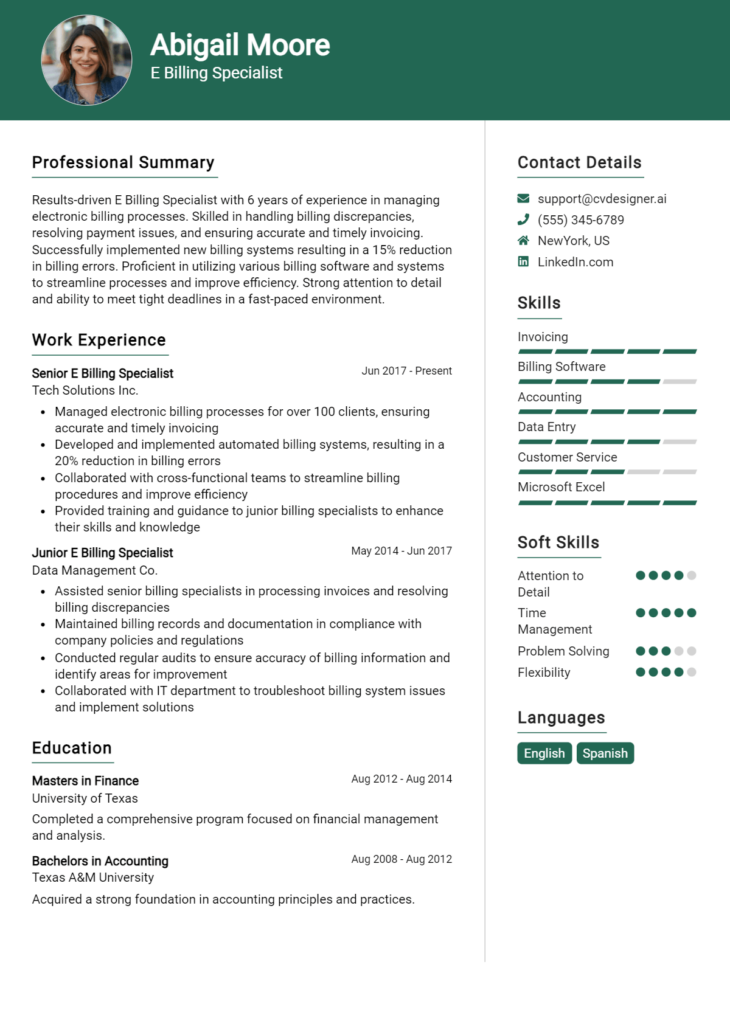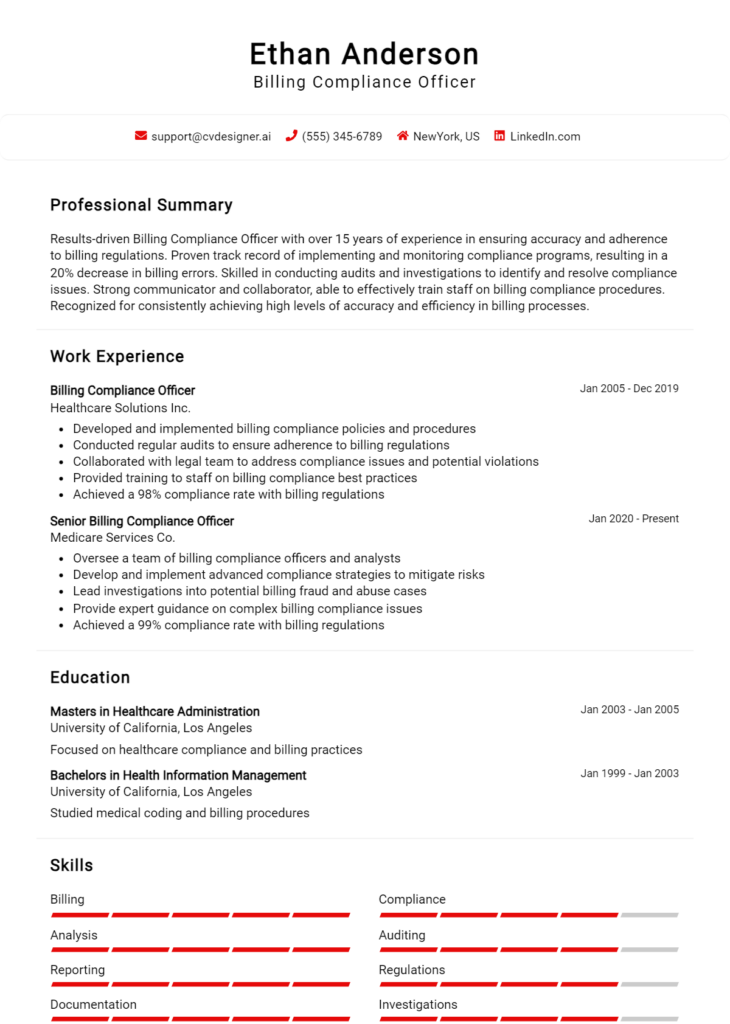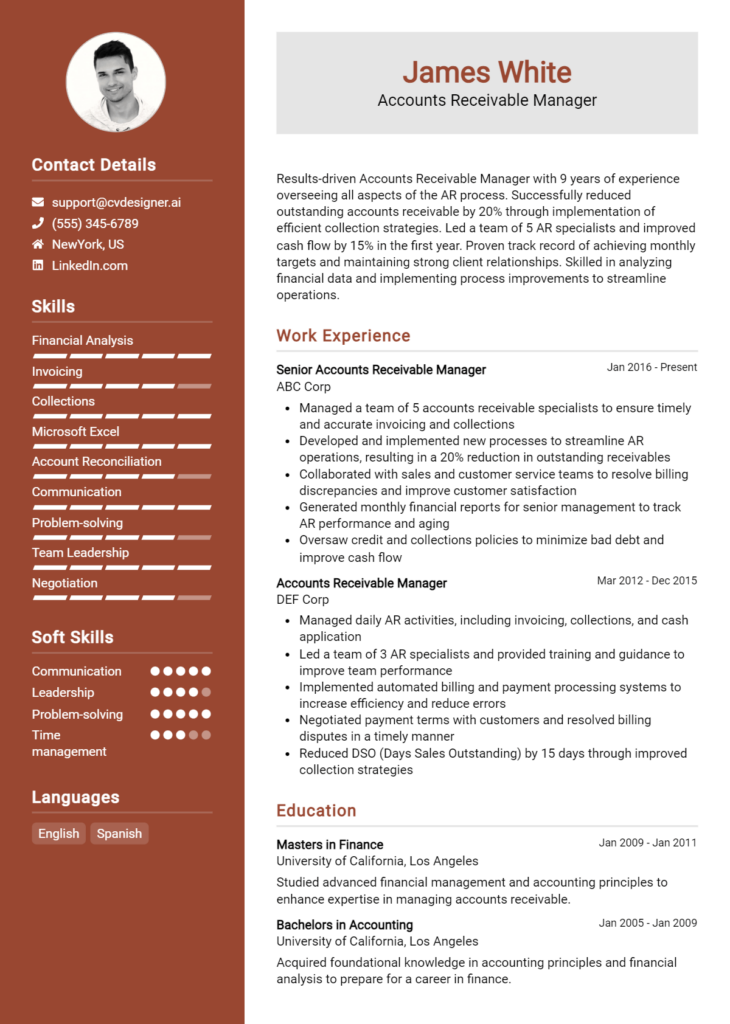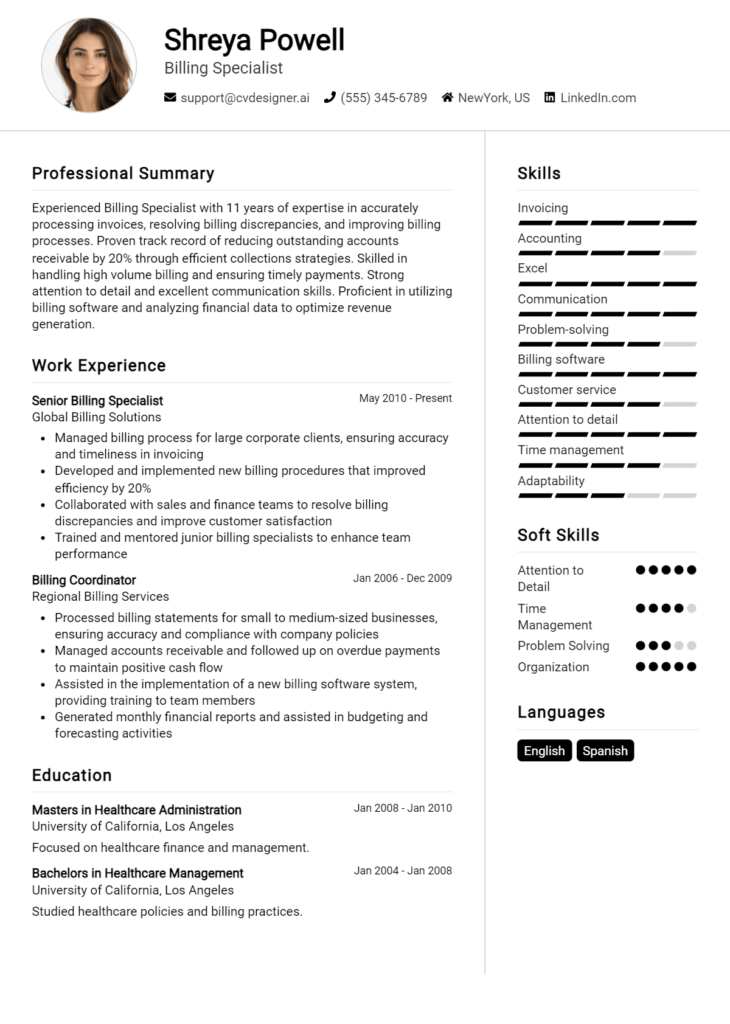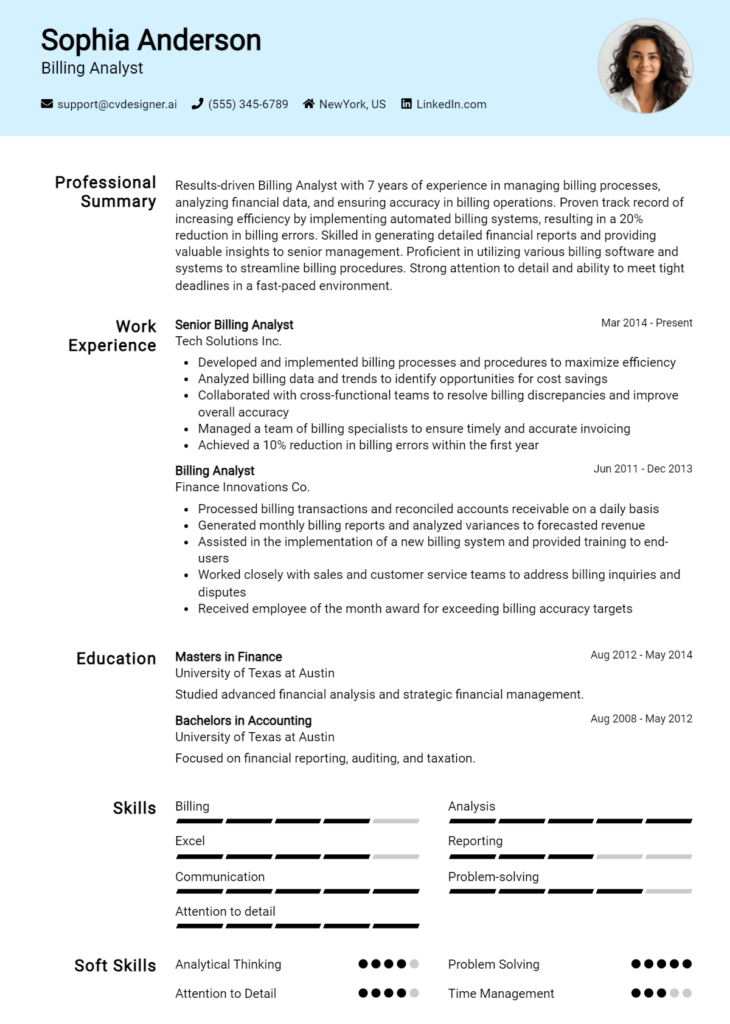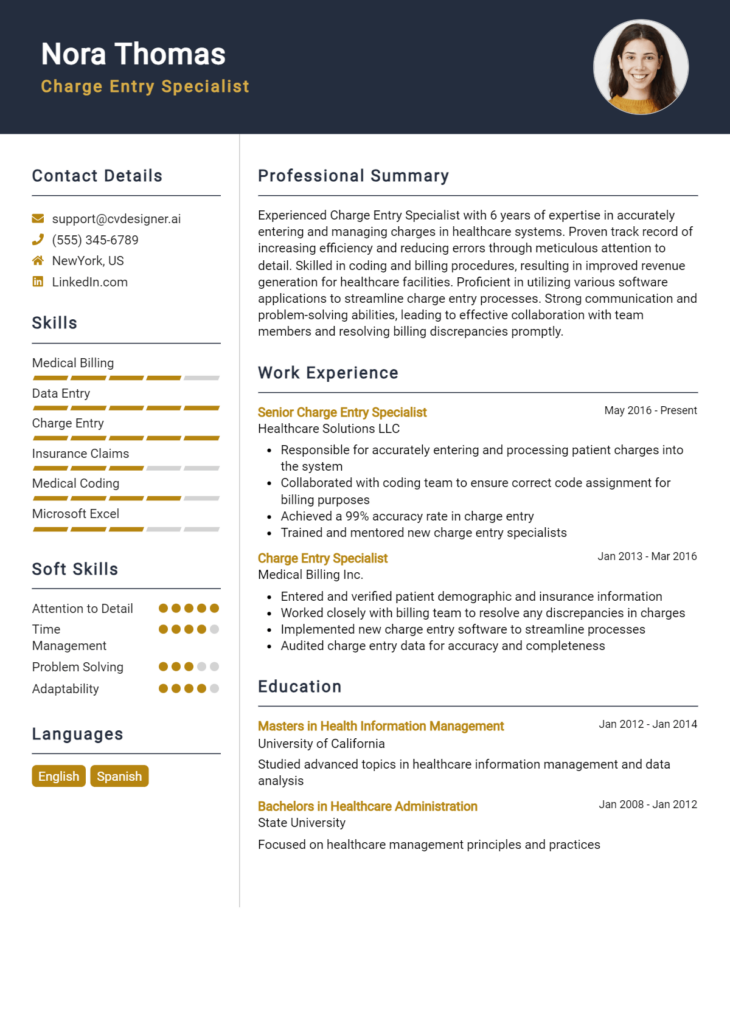Revenue Cycle Analyst Core Responsibilities
A Revenue Cycle Analyst plays a pivotal role in optimizing an organization’s financial performance by managing the entire revenue cycle process. This includes analyzing billing, coding, and collections data while collaborating with various departments like finance, healthcare providers, and IT. Essential skills encompass technical proficiency in data analytics, operational understanding of healthcare processes, and strong problem-solving abilities. By effectively showcasing these qualifications on a well-structured resume, candidates can demonstrate their contribution to achieving the organization’s financial goals.
Common Responsibilities Listed on Revenue Cycle Analyst Resume
- Analyze revenue cycle data to identify trends and areas for improvement.
- Collaborate with billing and coding teams to ensure compliance and accuracy.
- Monitor accounts receivable and implement strategies to reduce outstanding balances.
- Prepare financial reports and dashboards for management review.
- Conduct audits to ensure adherence to regulatory requirements.
- Assist in the development of policies and procedures for revenue cycle operations.
- Provide training and support to staff on revenue cycle best practices.
- Identify and resolve discrepancies between charges and payments.
- Utilize analytics tools to enhance revenue cycle efficiency.
- Support the integration of electronic health records (EHR) systems.
- Communicate effectively with stakeholders to improve overall revenue management.
High-Level Resume Tips for Revenue Cycle Analyst Professionals
In today’s competitive job market, a well-crafted resume is crucial for Revenue Cycle Analyst professionals looking to make a lasting impression on potential employers. As the first point of contact between you and your dream job, your resume must effectively showcase not only your skills but also your achievements in the revenue cycle domain. A compelling resume can set you apart from other candidates by highlighting your unique contributions to previous roles, demonstrating your expertise in industry-specific practices, and aligning closely with the job description. This guide will offer practical and actionable resume tips specifically tailored for Revenue Cycle Analyst professionals, helping you to create a document that opens doors to exciting career opportunities.
Top Resume Tips for Revenue Cycle Analyst Professionals
- Tailor your resume to each job description by using keywords and phrases that align with the role's requirements.
- Highlight relevant experience in revenue cycle processes, such as billing, collections, and coding.
- Quantify your achievements by including metrics, such as percentage increases in collections or reductions in days in accounts receivable.
- Showcase industry-specific skills, such as proficiency in electronic health record (EHR) systems and claims management software.
- Include certifications relevant to the field, like Certified Revenue Cycle Specialist (CRCS) or Certified Coding Specialist (CCS).
- Use clear, concise language and bullet points to ensure easy readability and quick comprehension of your qualifications.
- Incorporate soft skills such as analytical thinking, problem-solving, and effective communication that are essential for collaboration within healthcare teams.
- Keep your resume to one or two pages, ensuring that all content is relevant and impactful.
- Consider a professional summary or objective statement at the top that encapsulates your career goals and what you bring to the role.
- Proofread your resume thoroughly to eliminate any spelling or grammatical errors that could detract from your professionalism.
By implementing these tips, you can significantly enhance your resume’s effectiveness, increasing your chances of landing a job in the Revenue Cycle Analyst field. A well-structured and targeted resume not only highlights your qualifications but also demonstrates your commitment to the role, making you a standout candidate in a field that values precision and expertise.
Why Resume Headlines & Titles are Important for Revenue Cycle Analyst
In the competitive field of healthcare finance, the role of a Revenue Cycle Analyst is critical for enhancing organizational efficiency and revenue collection. When applying for this position, the importance of a well-crafted resume headline or title cannot be overstated. A strong headline can immediately capture the attention of hiring managers, providing a succinct summary of a candidate's key qualifications and areas of expertise in just a few impactful words. It should be concise, relevant, and directly aligned with the job being sought, setting the tone for the rest of the resume and encouraging the reader to delve deeper into the applicant’s credentials.
Best Practices for Crafting Resume Headlines for Revenue Cycle Analyst
- Keep it concise: Aim for a headline that is no longer than 10-12 words.
- Be role-specific: Use terminology that is relevant to the Revenue Cycle Analyst position.
- Highlight key skills: Incorporate your most relevant skills or certifications directly into the headline.
- Showcase accomplishments: If possible, include a quantifiable achievement to demonstrate your impact.
- Use action-oriented language: Choose strong verbs that convey your capabilities and achievements.
- Tailor to the job description: Customize your headline for each application to reflect the specific requirements and responsibilities of the role.
- Avoid jargon: Use clear and straightforward language that any hiring manager can understand.
- Be authentic: Ensure that the headline accurately reflects your experience and qualifications.
Example Resume Headlines for Revenue Cycle Analyst
Strong Resume Headlines
Results-Driven Revenue Cycle Analyst with 5+ Years of Experience in Healthcare Finance
Detail-Oriented Analyst Specializing in Optimizing Revenue Cycle Processes and Reducing Denials
Certified Revenue Cycle Specialist Focused on Enhancing Financial Performance and Compliance
Proven Track Record in Streamlining Billing Operations and Increasing Collections by 20%
Weak Resume Headlines
Analyst with Some Experience
Healthcare Professional Seeking Opportunities
The strong headlines exemplify clarity and specificity, effectively communicating the candidate's qualifications and relevant experience to hiring managers. Each headline captures key skills, achievements, or certifications that directly relate to the Revenue Cycle Analyst role, making them compelling and memorable. In contrast, the weak headlines lack specificity and fail to convey any real value, leaving hiring managers with little reason to engage further. They do not highlight unique strengths or relevant experiences, which diminishes the candidate's chances of making a strong impression.
Writing an Exceptional Revenue Cycle Analyst Resume Summary
Writing a compelling resume summary is essential for a Revenue Cycle Analyst as it serves as the first impression for hiring managers. A well-crafted summary efficiently encapsulates the candidate's key skills, relevant experience, and notable accomplishments, making it easier for recruiters to quickly assess qualifications. Given the competitive nature of the healthcare industry, a strong summary must be concise yet impactful, tailored to align with the specific job description, and highlight the candidate's unique value proposition. This summary acts as a powerful tool to captivate the attention of hiring managers, setting the tone for the rest of the resume.
Best Practices for Writing a Revenue Cycle Analyst Resume Summary
- Quantify achievements to demonstrate impact, such as cost savings or improved efficiency.
- Focus on relevant skills that are highlighted in the job description, such as data analysis or billing procedures.
- Tailor the summary for each job application to reflect the specific requirements and keywords from the job posting.
- Use action verbs to convey a sense of proactivity and accomplishment.
- Keep it concise, ideally between 2-4 sentences, to maintain the hiring manager's attention.
- Highlight industry-specific knowledge, such as familiarity with healthcare regulations and compliance.
- Showcase soft skills, such as communication and problem-solving, which are crucial for collaboration in revenue cycle management.
- Include any relevant certifications or training that enhance your qualifications for the role.
Example Revenue Cycle Analyst Resume Summaries
Strong Resume Summaries
Results-driven Revenue Cycle Analyst with over 5 years of experience optimizing billing processes, achieving a 20% reduction in claims denials through effective data analysis and strategic process improvements. Skilled in utilizing analytics tools to enhance revenue management and ensure compliance with healthcare regulations.
Detail-oriented professional with a proven track record of increasing revenue by 15% year-over-year. Experienced in identifying inefficiencies in the revenue cycle and implementing corrective measures that improve billing accuracy and reduce processing times.
Dedicated Revenue Cycle Analyst with expertise in financial reporting and data analytics, successfully leading a project that decreased days in accounts receivable from 60 to 45 days. Proficient in the use of advanced software tools and committed to leveraging data to enhance organizational performance.
Weak Resume Summaries
Experienced analyst seeking a role in revenue cycle management. I have worked in various related positions and have some knowledge of billing processes.
Hardworking professional looking to contribute to a team in the healthcare sector. I have experience in data management and am interested in revenue cycle operations.
The examples provided demonstrate clear distinctions between strong and weak resume summaries. Strong summaries are characterized by their specificity, quantifiable achievements, and direct relevance to the role of a Revenue Cycle Analyst. They effectively communicate the candidate's impact and expertise, making them memorable to hiring managers. In contrast, weak summaries lack detail and measurable outcomes, rendering them generic and forgettable, which can diminish a candidate's chances of standing out in a competitive job market.
Work Experience Section for Revenue Cycle Analyst Resume
The work experience section of a Revenue Cycle Analyst resume is crucial as it provides a detailed overview of a candidate's professional background, showcasing not only technical skills but also their ability to manage teams and deliver high-quality outcomes. This section serves as a platform for candidates to highlight their relevant experience and accomplishments, making it imperative to quantify achievements and align them with industry standards. By effectively illustrating their capabilities in optimizing revenue cycles, candidates can demonstrate their value to potential employers and set themselves apart from the competition.
Best Practices for Revenue Cycle Analyst Work Experience
- Focus on quantifiable achievements, such as percentage improvements in revenue capture or reductions in claim denials.
- Highlight specific technical skills relevant to revenue cycle management, such as proficiency in EHR systems or data analysis tools.
- Include examples of successful collaboration with cross-functional teams, emphasizing communication and teamwork.
- Use action verbs to convey a sense of initiative and leadership in your roles.
- Tailor your experience to align with industry standards, using terminology and metrics common in the revenue cycle field.
- Showcase problem-solving abilities by detailing challenges faced and the solutions implemented.
- Provide context for your achievements, illustrating the impact of your contributions on the organization.
- Keep descriptions concise and focused, ensuring clarity and ease of reading for hiring managers.
Example Work Experiences for Revenue Cycle Analyst
Strong Experiences
- Led a cross-functional team to implement a new billing system, resulting in a 25% reduction in claim processing time and a 15% increase in overall revenue.
- Analyzed revenue cycle data to identify trends, leading to the development of strategies that decreased claim denials by 30% over six months.
- Developed and delivered training programs for staff on billing compliance, which improved adherence rates by 40% within one year.
- Collaborated with IT to enhance reporting tools, increasing data accuracy and reporting efficiency by 50%.
Weak Experiences
- Worked with the billing department to assist with various tasks.
- Involved in projects that aimed at improving revenue cycle processes.
- Participated in meetings to discuss revenue-related issues.
- Helped in the implementation of new software for billing.
The examples listed as strong experiences are considered effective because they provide specific, quantifiable outcomes that demonstrate the candidate's impact on the organization. They highlight leadership, technical skills, and collaboration, giving a clear view of the candidate's capabilities. In contrast, the weak experiences lack detail and measurable results, making them less impressive and failing to convey the candidate's true potential and contributions in the revenue cycle management field.
Education and Certifications Section for Revenue Cycle Analyst Resume
The education and certifications section of a Revenue Cycle Analyst resume is a critical component that showcases the candidate's academic background and commitment to professional development. This section provides potential employers with insights into the applicant's foundational knowledge in healthcare finance, billing practices, and coding regulations. Highlighting industry-relevant certifications and any specialized training demonstrates the candidate's dedication to continuous learning and adaptability in a rapidly changing field. By including pertinent coursework and recognized credentials, candidates can significantly enhance their credibility and alignment with the specific requirements of the Revenue Cycle Analyst role.
Best Practices for Revenue Cycle Analyst Education and Certifications
- Prioritize relevant degrees, such as a Bachelor's in Healthcare Administration or Finance.
- Include industry-recognized certifications, like Certified Revenue Cycle Representative (CRCR) or Certified Healthcare Financial Professional (CHFP).
- List any specialized training courses that relate to revenue cycle management, coding, or billing systems.
- Be specific about relevant coursework that supports your analytical and financial skills.
- Keep the section concise, focusing on the most impactful and relevant qualifications.
- Highlight any advanced degrees or additional certifications that differentiate you from other candidates.
- Update the section regularly to reflect newly obtained qualifications or changes in the industry.
- Consider including honors or recognitions that underscore your achievements in the academic or professional realm.
Example Education and Certifications for Revenue Cycle Analyst
Strong Examples
- Bachelor of Science in Healthcare Administration, University of Health Sciences, 2020
- Certified Revenue Cycle Representative (CRCR), Healthcare Financial Management Association, 2021
- Coursework in Medical Coding and Billing, Community College of Health, 2019
- Certified Healthcare Financial Professional (CHFP), Healthcare Financial Management Association, 2022
Weak Examples
- Bachelor of Arts in English Literature, University of Arts, 2018
- Certification in Basic First Aid, Red Cross, 2020
- Online Course in Creative Writing, Coursera, 2021
- High School Diploma, Central High School, 2017
The strong examples are considered effective because they directly relate to the skills and knowledge necessary for a Revenue Cycle Analyst, showcasing relevant degrees and certifications that enhance the candidate's qualifications. In contrast, the weak examples are ineffective due to their lack of relevance to the role, highlighting degrees and certifications that do not contribute to the candidate's credibility in the revenue cycle field. This distinction is crucial for properly aligning qualifications with job requirements.
Top Skills & Keywords for Revenue Cycle Analyst Resume
In the competitive field of healthcare finance, a Revenue Cycle Analyst plays a crucial role in ensuring that the revenue cycle runs smoothly and efficiently. The effectiveness of a Revenue Cycle Analyst largely depends on their skills, which not only enhance their ability to analyze and improve financial processes but also facilitate collaboration with various stakeholders. A well-crafted resume that highlights relevant skills can significantly increase the chances of landing an interview. By focusing on both hard and soft skills, candidates can present a comprehensive picture of their capabilities, demonstrating their readiness to tackle the complexities of revenue cycle management.
Top Hard & Soft Skills for Revenue Cycle Analyst
Soft Skills
- Analytical Thinking
- Attention to Detail
- Problem-Solving
- Communication Skills
- Team Collaboration
- Adaptability
- Time Management
- Critical Thinking
- Customer Service Orientation
- Conflict Resolution
Hard Skills
- Knowledge of Medical Billing and Coding
- Proficiency in Revenue Cycle Management Software
- Data Analysis and Reporting
- Financial Forecasting
- Understanding of Healthcare Regulations
- Proficient in Microsoft Excel
- Accounts Receivable Management
- Claims Processing
- Electronic Health Record (EHR) Systems
- Knowledge of CPT/ICD-10 Coding
By effectively incorporating these skills into your resume, you can showcase your qualifications as a Revenue Cycle Analyst. Additionally, emphasizing your relevant work experience can further strengthen your application, making you a standout candidate in the job market.
Stand Out with a Winning Revenue Cycle Analyst Cover Letter
I am excited to apply for the Revenue Cycle Analyst position at [Company Name], as advertised on [Job Board/Company Website]. With a solid background in healthcare finance and a passion for optimizing revenue cycles, I am confident in my ability to contribute effectively to your team. My experience includes analyzing financial data, identifying inefficiencies, and implementing strategies that enhance revenue recovery and streamline processes.
In my previous role at [Previous Company Name], I successfully conducted thorough audits of billing practices, which resulted in a 20% reduction in claim denials over six months. My analytical skills allowed me to pinpoint areas of improvement, and I collaborated with cross-functional teams to develop actionable solutions. I am proficient in using various revenue cycle management software and tools, including [specific software/tools], which enables me to provide accurate forecasts and insightful reports that drive informed decision-making.
I am particularly drawn to [Company Name] because of your commitment to innovation and excellence in patient care. I admire your focus on leveraging technology to improve operational efficiency, and I believe my proactive approach and problem-solving skills align well with your goals. I am eager to bring my expertise in data analysis and financial management to your organization, contributing to the continued success of your revenue cycle initiatives.
Thank you for considering my application. I look forward to the opportunity to discuss how my background and skills can benefit [Company Name]. I am excited about the possibility of joining your team and helping to ensure the financial health and sustainability of your organization.
Common Mistakes to Avoid in a Revenue Cycle Analyst Resume
When crafting a resume for a Revenue Cycle Analyst position, it's crucial to avoid certain common pitfalls that could undermine your chances of landing an interview. A well-structured and targeted resume showcases your skills and experience effectively, but missteps can detract from your qualifications. Here are some prevalent mistakes to watch out for:
Vague Job Descriptions: Using generic phrases instead of specific duties can make it difficult for hiring managers to assess your qualifications. Clearly outline your responsibilities and achievements.
Ignoring Keywords: Failing to incorporate relevant industry keywords can hinder your resume's chances of passing through Applicant Tracking Systems (ATS). Tailor your resume to match the job description.
Overloading with Information: Including excessive details can overwhelm readers. Focus on the most relevant experiences and skills that demonstrate your suitability for the role.
Lack of Quantifiable Achievements: Not providing metrics to illustrate your impact can weaken your resume. Use numbers to highlight improvements in revenue, efficiency, or compliance.
Inconsistent Formatting: A resume with inconsistent fonts, sizes, or bullet points can appear unprofessional. Maintain uniformity for a polished look that enhances readability.
Typos and Grammatical Errors: Errors in spelling or grammar can give the impression of carelessness. Always proofread and consider using tools to catch mistakes before submitting your resume.
Not Tailoring for Each Application: Sending the same resume for every job application can be ineffective. Customize your resume to align with each specific job's requirements and company culture.
Neglecting Soft Skills: Focusing solely on technical abilities while neglecting soft skills like communication and teamwork can be a missed opportunity. Highlight both to show your well-roundedness as a candidate.
Conclusion
As we explored the essential skills and responsibilities of a Revenue Cycle Analyst, it’s clear that this role is pivotal in ensuring the financial health of healthcare organizations. Key competencies include proficiency in data analysis, understanding of billing processes, and the ability to collaborate with various departments. Additionally, strong communication skills are vital for liaising with healthcare providers and payers to resolve discrepancies and optimize revenue flow.
In light of these insights, it’s crucial for aspiring or current Revenue Cycle Analysts to present their qualifications effectively. Take a moment to review your resume and ensure it highlights your relevant experience and skills.
To assist you in this endeavor, consider utilizing resources like resume templates and resume examples for inspiration. If you're looking to create a polished resume quickly, the resume builder can be a great asset. Furthermore, don’t overlook the importance of a compelling introduction; check out the cover letter templates available to enhance your application package.
Empower your career as a Revenue Cycle Analyst by ensuring your resume stands out. Start reviewing and updating it today!

